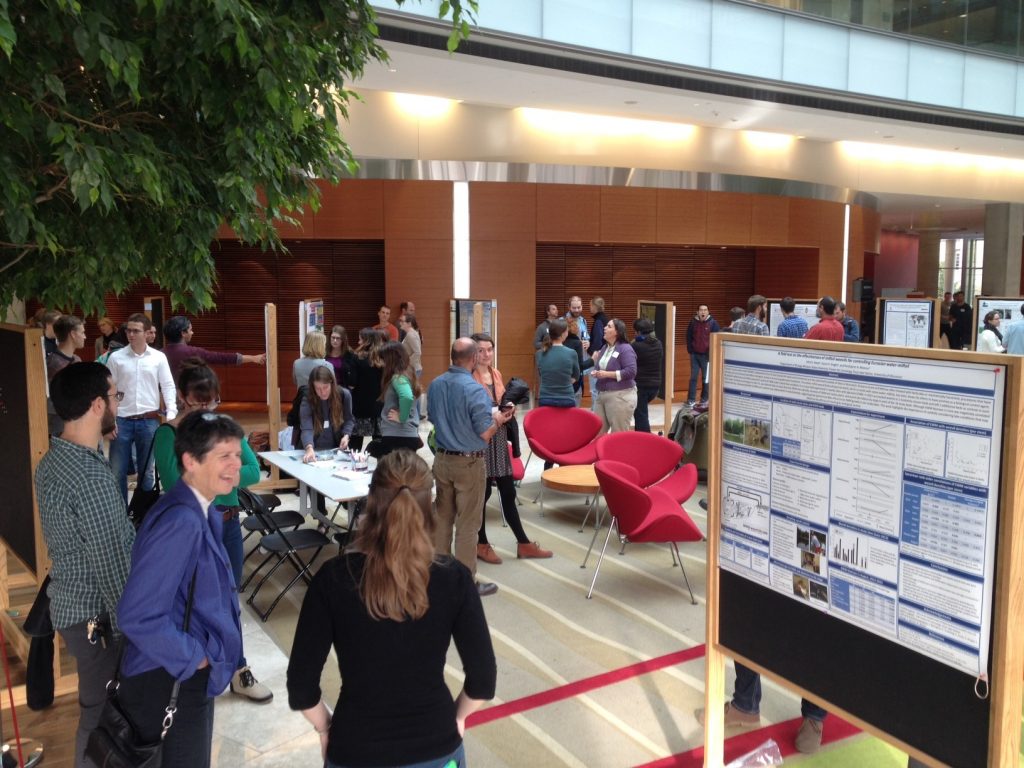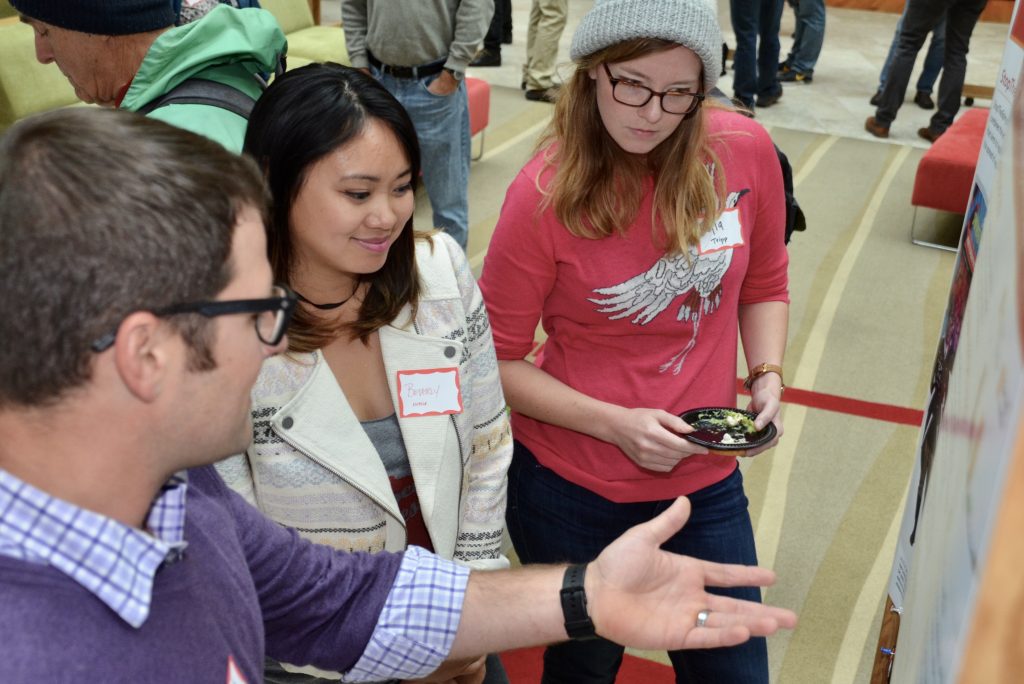 When: 4:30pm-6:30pm Tuesday, October 16th, 2018
When: 4:30pm-6:30pm Tuesday, October 16th, 2018
Where: The Sunset Lounge, Memorial Union
Event Details
Please join us for the annual Water@UW-Madison Fall Poster Session, a free event featuring research, art, and activities about water in the UW-Madison community. The event is free and open to the public (registration not required), and will include:
- Posters featuring the work of UW faculty, students, and water resource professionals
- Refreshments and a cash bar
- Opportunities to network with people from all over the UW-Madison Water Community
Stay after the poster session this year to attend An Evening with Dan Egan, the author of this year’s Go Big Read “The Death and Life of the Great Lakes”, which will take place at 7pm across the hallway in Shannon Hall, Memorial Union. This event is also unticketed and open to the public.
Featured Posters
- Evaluating water quality in the Yahara Watershed under changes in land cover, land management, and climate | Tracy Campbell, Dr. Chris Kucharik, and Dr. Eric Booth | Departments of Agronomy and Civil & Environmental Engineering
- Hydroclimate Extremes Research Group | Dr. Daniel Wright, Dr. Zhe Li, Guo Yu, Chris Bosma, Sam Hartke, Yihan Li | Department of Civil & Environmental Engineering
- Safe operating space for walleye | Holly Embke and Dr. Jake Vander Vanden | Center for Limnology
- Environmental Biogeochemistry at UW-Madison | Sarah Balgooyen, Emma L. Trainer, Marissa Kneer, Madeleine Mathews, Lily Schacht, Sarah Dance, Morgan Sanger, Amy Plechacek, Marie Dematatis, and Dr. Matthew Ginder-Vogel | Environmental Chemistry and Technology Program and Departments of Civil & Environmental Engineering and Geological Engineering
- Potential climate change impacts to groundwater flow and stream temperature in the Marengo River | Anna Fehling | Department of Geological Engineering
- The Waubesa Wetlands Watershed: Assessing land use change and promoting community engagement | Némesis Ortiz-Declet, Rachel Johnson, Steph Herbst, Courtney Botelho, Lianna Johnson, Kyle Pepp, and Mitch Buthod | Water Resources Management, Nelson Institute for Environmental Studies
- Antibody development and serologic test validation in juvenile northern pike (Esox lucius) experimentally infected with viral hemorrhagic septicemia virus | Whitney A. Thiel, Dr. Kathy L. Toohey-Kurth, Dr. Tony L. Goldberg | School of Veterinary Medicine
- Degradation of organic contaminants in natural and engineered aquatic systems | Devon Manley Bulman, Sarah Balgooyen, Emma Leverich Trainer, Stephanie M. Berg, Reid Milstead, Amber White, and Dr. Christina K. Remucal | Environmental Chemistry and Technology Program and Department of Civil & Environmental Engineering
- Hydroecology Research Group | Dominick Ciruzzi, Carolyn Voter, Arthur Ryzak, William Avery, Dr. Eric Booth, and Dr. Steve Loheide | Departments of Civil & Environmental Engineering and Geological Engineering and the Nelson Institute for Environmental Studies
- North Central Region Water Network: Creating impact through networks | Rebecca Power and Anne Nardi | North Central Region Water Network, UW-Extension
- UW-Madison’s Aquatic Sciences Center: Opportunities for researchers and students | Abigail Cook and Molly Daniels | UW-Madison Aquatic Sciences Center
- Water Systems and Society Research Group | Sarah Alexander, Donghoon Lee, Colin Mcguire, and Dr. Paul Block | Department of Civil & Environmental Engineering
- Microbiomes of freshwater lakes and engineered wastewater systems | Elizabeth McDaniel, Amber White, and Dr. Katherine (Trina) McMahon | Microbiology Doctoral Training Program, Environmental Chemistry and Technology Program, and Departments of Civil & Environmental Engineering and Bacteriology
- New life cycle impact assessment model for freshwater eutrophication | Dr. Robert P. Anex and Edgardo Ortiz-Reyes | Department of Biological Systems Engineering
- Tackling Wisconsin and Great Lakes science and policy challenges through new state fellowship opportunities | Yi Liu, Elizabeth Tristano, Stephanie DeVries, and Francisco Guerrero-Bolaño | University of Wisconsin Sea Grant Institute, Wisconsin Water Resources Institute, Wisconsin Coastal Management Program, Wisconsin Department of Natural Resources, and Wisconsin Geological and Natural History Survey
- NADP sample processing at the Wisconsin State Laboratory of Hygiene: Conventional strategies and new approaches | Kirsten Widmayer and Chris Worley | Wisconsin State Laboratory of Hygiene
- Examining Hg stable isotopes in the Fox River of northeastern Wisconsin and future directions | Tylor Rosera | Environmental Chemistry and Technology Program
- The North Temperate Lakes Long Term Ecological Research | Dr. Noah Lottig and Dr. Emily Stanley | North Temperate Lakes LTER
- Invasion ecology in the North Temperate Lakes | Michael J. Spear, Dr. Jake R. Walsh , and Dr. M. Jake Vander Zanden | Center for Limnology
For Presenters: Poster Requirements
 All posters must meet the following requirements:
All posters must meet the following requirements:
- Poster dimensions no larger than 46″x 46″
- Boards for mounting will be provided at the event
- The mounting of the display must be able to be completed by 4:00 and remain up until 8:30pm-9:00pm on the day of the event*
- During the poster session, one person must remain at the display to answer questions or engage attendees on the contents of the display**
- The poster should present information in a visually appealing way and be accessible to a general audience
- No vulgar, explicit, or otherwise inappropriate content, please
- Please note outlets may not be available, if you want to use a laptop it will need to run off the battery
* Detailed information on poster set-up and location at the event will be sent to you following approval of your abstract. If you cannot stay to remove your poster between 8:30pm and 9:00pm, we will do that for you and store it at the Center for Limnology where you can pick it up later that week.
** Poster presenters will be guaranteed entry to Dan Egan’s lecture (one per poster) so that at least one presenter can stay with the poster through 6:30pm without fear of missing out on the lecture should a line begin to form.